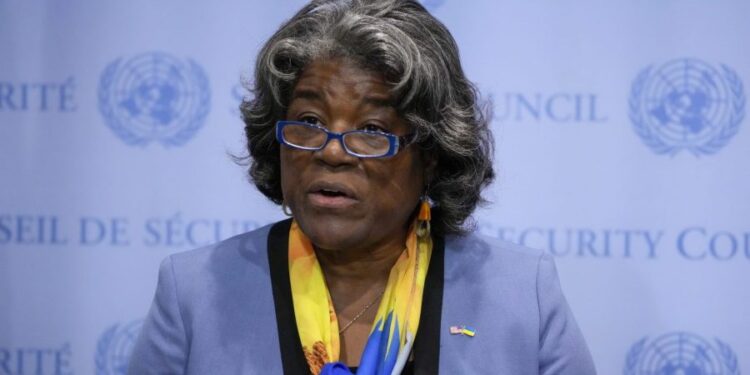
The Biden administration is calling for adding two permanent seats for African nations to the United Nations Security Council, and an elected seat for a small-island developing nation.
U.S. Ambassador to the United Nations Linda Thomas-Greenfield announced the proposal Thursday, capping off her nearly four-year effort to give more power to countries historically isolated from decisionmaking on international peace and security.
The announcement comes as the United Nations General Assembly is set to convene Sept. 22-24. It’s not clear if negotiations surrounding the reforms would be ready by the time for the general assembly, but a senior administration official said the U.S. is prepared to pursue “text-based negotiations,” prepare amendments and “get to work on a resolution for a vote in the general assembly to amend the U.N. Charter.”
“The announcement we’re making today helps to put some meat around the bones of our vision for a reformed Security Council, but there are many questions that will need to be addressed between and among member states, and that ultimately will be fodder for the text-based negotiations,” the official said, briefing reporters in a call Thursday morning.
The U.S. is not proposing veto power for the permanent seats for African nations. The five permanent members to the council have this power: the U.S., United Kingdom, France, China and Russia.
The security council can impose economic sanctions, arms embargoes, travel bans, blockades, the severing of diplomatic relations or even collective military action.
Along with the permanent members, it is made up of 10 seats with members elected to two-year terms. Some of these seats are reserved for countries of geographic influence.
The U.S. proposal for the rotating seat for a “small-island developing state” refers to 39 states across the Caribbean, Pacific, Atlantic, Indian Ocean and South China Sea.
“Many member states agree these 39 states representing 65 million people, deserve a consistent say in the council and their perspective on matters of peace and security, particularly as it relates to climate change, will benefit all of us,” the administration official said.
While African states fill three rotating seats, the administration official said that these countries were in favor of two permanent seats, despite not having veto power, because it offers “perspective, and durability of that perspective on the council, that is otherwise not afforded by a rotating seat.”
The five permanent members hold veto power — which is used to block action but has also paralyzed the council’s ability to address conflicts such as Russia’s war in Ukraine and efforts to compel Israel to accept a cease-fire in its war against Hamas in the Gaza Strip.
The U.S. has not expressed its stance on the total number of permanent and nonpermanent seats on a reformed council, saying that those discussions should be part of the text-based negotiations that also are conducted as part of the Intergovernmental Negotiations on Security Council Reform.
“We’ve unveiled this proposal to partners and allies around the world in recent days, and we’ve been really heartened by the enthusiastic feedback. This process won’t be quick or simple, but it’s something we’re serious about,” the official said.
The U.S. also supports creating permanent seats for Germany, India and Japan, and permanent seats for countries from Latin America and the Caribbean.
“We recognize there will never be a perfect Security Council, there will never be a model Security Council reform that satisfies everyone’s goals,” the official said.
“But our view on this is we cannot let the perfect be the enemy of the good, and we can and should still try to achieve a reform council that is more representative, more credible, and ultimately more effective in addressing the challenges and opportunities that the world faces today.”







